A few years ago I saw Gregor posting on Twitter about a trip to explore the East African tech scene. This was about the time when I started to hear more about the emerging African tech hubs. Which was surprising to me because until then I was actually pretty ignorant and had no idea what was going on in that part of the world. My view of Africa was mostly shaped by the general narrative we see in the western news, learn in school and the billboard advertisements of some NGOs. Prejudices imagining poverty (defined by a low GDP), malaria, safari tours, and everything but booming, creative tech and innovation hubs. :)
So when I heard about Gregor’s idea of an AfricaHackTrip I got super excited and wanted to join and learn more about what is going on there. And I am very greateful that I got a chance to become part of the AfricaHackTrip team.
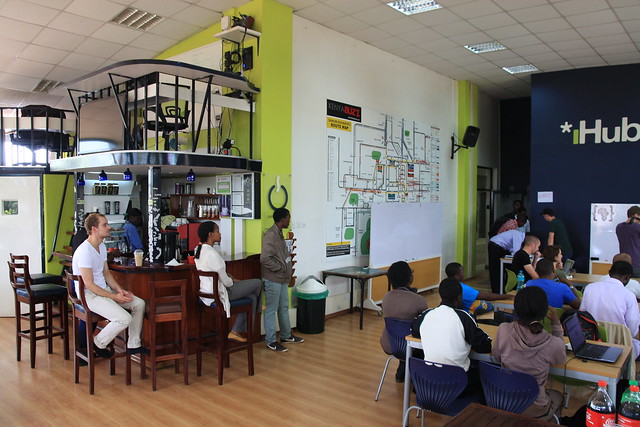
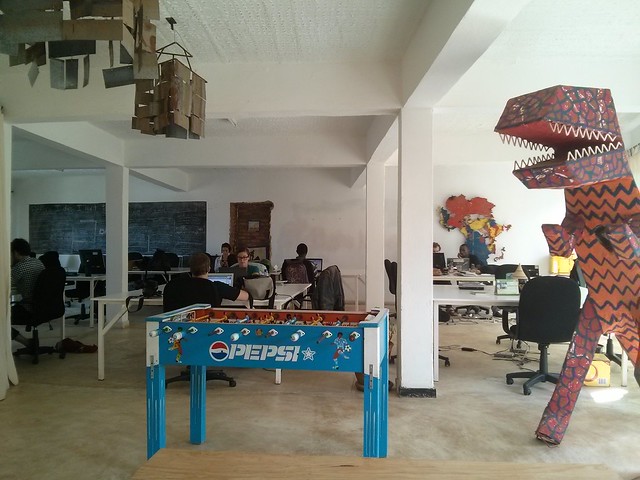
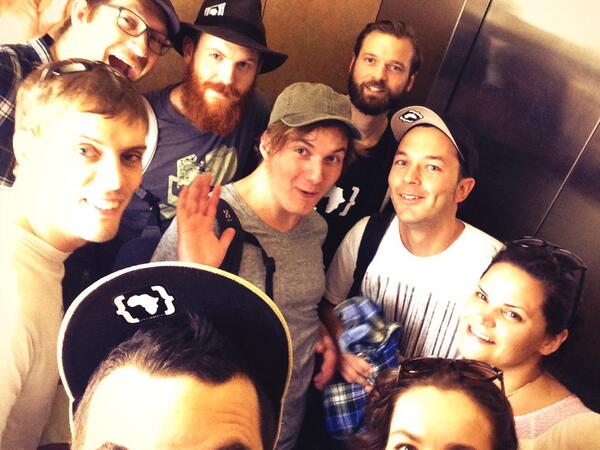
The AfricaHackTrip is basically a bunch of developers and designers from Europe exploring the East African tech scene. Before we had been working with people from all over the world, but not yet with hackers from Africa. We were curious and we changed that.
At the same time we also wanted to share our experiences with our local communities in Europe and kick off a continuous exchange.
Part of that plan was to shot a video and to do interviews to learn from people we met exploring the tech ecosystem of East Africa.
It took us ages to finish the movie but it is finally here! \o/
The trip was already a few years ago and a lot has happened since then as the tech ecosystems have been growing super fast and have gained more attention. But the topic is very relevant and many still belive the narrative of the Africa of the 80s and 90s. I hope the movie and all the projects that happend and happen related to the AfricaHackTrip help a bit to change that.
The 30 minutes documentary contains material from the barcamps and hackathons in Nairobi, Kampala, Kigali and Dar es Salaam and a lot of interviews with some of the incredible people we met.
You are invited to the movie screening on August 5th in Berlin at the Mozilla offices - or if you have a good excuse and can not make it, here you can watch it online:
We have more clips on the website and here is even more around that topic, partly with material and content from the AfricaHackTrip:
The whole trip was self-funded but GitHub (who also joined) and Mozilla supported the events and the generous contributions of our patient supporters made the movie possible. Thank you so much for your support!!
I also want to mention that this is nothing special and I encourage everybody to do the same and simply go there and learn. If you’re interested in tech or even work remotely you should really consider a trip and work a while from one of the tech hubs there. ( that is assuming you’re from Europe or the US… because we are extremely priviliged to be able to do that as our unfair visa requirements in the EU/US sadly make doing an EuroHackTrip like we did the AfricaHackTrip next to impossible. Please hear Jasper Grosskurth’s interview on that.)
Thank you so much and I am looking forward to your thoughts.
It is pretty amazing to live in a time when it is possible to broadcast data through satellites to pretty much the whole planet. The Blockstream Satellite project makes this possible.

Their Satellite network not only broadcasts the Bitcoin blockchain around the world 24/7 for free but also provides an API that allows everybody to broadcast messages through this network. This is possible for for a small fee payable through the Bitcoin lightning network.
To make it easy to broadcast messages from any ruby application I’ve written the blocksteam satellite gem.
The ruby package sends broadcast orders to the API and uses a connected lightning (lnd) node to pay for the order.
Check out the quick example:
require "blockstream_satellite" order = BlockstreamSatellite::Order.create(path: '/path/to/file') puts order.status #=> pending order.pay # sends the lightning payment using the configured lnd client puts order.status #=> transmitting order.refresh puts order.status #=> sent
Have fun using ruby to send data to space and back!
The Bitcoin lightning network is growing quickly. The lightning network is an exciting second layer protocol on top of the Bitcoin network that allows to send real near-instant payments and is perfectly suited for micro-/nano-transactions.
The tools already work great and make it super easy for developers to integrate with the lightning network.
I’ve lately experimented with it and built a demo to show machine-to-machine API payments. It allows the server to request a payment from the client; the client can automatically pay the invoice to access the resource from the server.
The basic workflow is as follows:
To make it easy for the developer all this can happen in the background so the payment logic can be abstracted and hidden from the developer.
Here is a small ruby application that exposes an endpoint to convert markdown to pdf but requires the client to pay 100 satoshi (currently 0.44 cent) per request.
You can find the code here on GitHub. And I made a short video showing how it works:
To make it easy for every ruby developer to add lightning payment requests to any ruby application I've written rack-lightning.
rack-lightning is a rack middleware that handles the lightning invoice creation and validation on the server.
A full usage example can be found on GitHub, but it is not more than adding one line of rack code:
use Rack::Lightning, { price: 100 }
Have a look at the GitHub page for more information.
And to make it easy on the client side I've written a faraday middleware that handles the payment requests on the client: faraday_ln_paywall
The middleware handles the payment of the invoice. Her is a quick useage example:
# initialize a client
client = Faraday.new(:url => 'https://lightning-2pdf.herokuapp.com/') do |faraday|
faraday.use FaradayLnPaywall::Middleware, { max_amount: 100 }
faraday.adapter Faraday.default_adapter
end
# use the client to do API calls:
puts client.post("/convert/pdf", "# Hallo Welt").body
Head over to the GitHub repository for more information.
A few years back I did something similar with pure bitcoin.
And an exciting project is lightning.ws that does something similar in Go
Halloween nights are scary and you are supposed to do scary things. This year I had a few hours in the hotel and so I've built a ruby wrapper around the openalias.rs rust package. That is scary because I have no idea about rust :D
But fist things first, what is OpenAlias?
OpenAlias is an open standard for simpler addresses for any crypto currencies.
It is a DNS based alias system that allows you to use a domain to lookup a cryptocurrency address. So for example, if your wallets supports it (e.g. Electrum) you can simply send Bitcoin to “michaelbumann.com” instead of my Bitcoin address.
At its most basic, OpenAlias is a TXT DNS record on a FQDN (fully qualified domain name). By combining this with DNS-related technologies [it has] created an aliasing standard that is extensible for developers, intuitive and familiar for users, and can interoperate with both centralised and decentralised domain systems.
Find more details on the OpenAlias.org website
What did I built?
For rust there is a package that does the DNS lookup and parsing of the OpenAlias entries. But we should have one for any language to make it easy for developers to integrate OpenAlias. That's why I made this ruby gem that ruby developers can use in their apps and use OpenAlias.
Right now it is using the rust library as a native extension, but at some point I might write a pure ruby one.
Have a look at bumi/openalias-ruby on GitHub.
I’ve recently updated and re-installed some of my servers and bitcoin and lightning nodes that I am running. It’s amazing how easy it is to run and operate your own bank and payment service. And I encourage everybody to operate your own bitcoin full-node and lightning node.
Even though there are plenty of resources out there on how to install everything you need on the various systems, here are a few notes on my setup. - maybe it helps somebody. :)
I am running currently:
* Bitcoin core 0.17.0
* lnd 0.5.0-beta
My goal is to have my setup as simple and as default as possible. I am using the default packages where possible and I try to be able to update to latest versions quickly.
For parts of the setup I am using some custom ansible scripts which I will not cover here (ansible is rather sooner than later a pain anyway and you should not use it)
build-essential, git, unattended-upgrades, vim, zsh,...
make sure to secure your system: ufw, fail2ban, lynis, rkhunter
The how-to run a full node on bitcoin.org has all the information you need to install bitcoind.
Basically installing bitcoind from the bitcoin ubuntu packages repository:
sudo apt-add-repository ppa:bitcoin/bitcoin
sudo apt-get update
sudo apt-get install bitcoind
I am running bitcoind as bitcoin user and have all the bitcoind data and config stored in the bitcoin’s home directory.
useradd -m bitcoin
mkdir /home/bitcoin/bitcoind_data
Adjust your bitcoind configuration. You can use the config file generator by Jameson Lopp. You also find all the config options in the wiki.
This is my config file - pretty standard, except the bitcoin datadir and the zeromq config that we will need later for lnd.
This is the default bitcoin systemd service configuration. By default it is loading the bitcoin.conf from /etc/bitcoin/bitcoin.conf. Though I am also storing the config file in the bitcoin dir /home/bitcoin/bitcoind_data which makes it easier for lnd to find it.
Don’t forget to open the bitcoin port; typically 8333 (ufw allow 8333)
Now you should be able run bitcoind using systemctl
sudo systemctl start bitcoind
sudo systemctl status bitcoind
When you want to see the logs in journalctl -u bitcoind you have to make sure that you are not running bitcoind as a daemon, change the Type in the of the systemd service from forking to simple and configure the printtoconsole bitcoind option. Otherwise it does print to console and the logs can not be captured. - But you can just look at the debug.log :)
Also note: when you update the bitcoind installation the systemd service and potentially your changes get overwritten.
To run lnd you need go 1.10 or better 1.11. I’ve manually downloaded go and extracted it to /usr/lib/go-1.11/
Make sure to that you have the go binary in your $PATH. I’ve linked the go bin to /usr/local/bin
sudo ln -s /usr/lib/go-1.11/bin/go /usr/local/bin/go
Also make sure that $GOPATH/bin is in your $PATH for all go installed executables.
I’ve added a /etc/profile.d/go.sh with:
export GOPATH=~/go
export PATH=$PATH:$GOPATH/bin
Once go is working install lnd as described here in the official installation notes. Make sure to run this from the bitcoin user as we have the default $GOPATH ~/go .
Similar to bitcoind I have LND configured to use /home/bitcoin/lnd_data as main lnd directory. This is my lnd.conf.
If you want to access your LND node remotely (for example from a mobile app) you need to configure it to rpclisten on a public interface and the port 10009 (default) must be open.
LND needs uses zeromq to read data from bitcoind so make sure you configured bitcoind with the zeromq config mentioned above.
And try your lnd setup:
lnd --configfile=/home/bitcoin/lnd_data/lnd.conf
It will tell you to create a wallet using lnci
lncli --lnddir=/home/bitcoin/lnd_data create
I use systemd to run lnd as a service. This is my service configuration which goes in /lib/systemd/system/lnd.service (don’t forget to systemctl enable it)
But please note that the wallet needs to be unlocked using the lncli on every start of lnd manually.
That should be it! Your bitcoin and lightning node should be up and running! Now it’s time for the fun part :)
So far I have tried the following lighting apps connected with my LND node:
To connect those client to you wallet you will need the tls.cert and the admin.macaroon. These files can be found in the lnd directory:
/home/bitcoin/lnd_data/tls.cert and /home/bitcoin/lnd_data/data/chain/bitcoin/mainnet/admin.macaroon
For ZAP iOS there is zapconnect that generates a QR code that can be scanned to configure the mobile client. Union7 has a similar feature described in the FAQ.
Once connected you can use the client or the lncli to get a new bitcoin address and fund your lightning wallet.
lncli --lnddir=/home/bitcoin/lnd_data newaddress p2wkh
Now it is time to go shopping! Maybe checkout bitrefill, Y’alls or buy some pixels on satoshis.place
All those sites have instructions on how to open channels. Also have a look at explorers like 1ML
If you have trouble, let me know!
if this did not help, maybe this write up has the right info for you
I was just chatting with the always inspiring Max today about GraphQL.I’ve never really used GraphQL in production but I am pretty excited about the flexibility it brings for clients to query data from a server. GraphQL provides a easily understandable description of the data an API provides and gives the client the possibility to query exactly the data it needs in one single request.
Currently I am not building any APIs but requesting data from Ethereum smart contracts, IPFS, etc. And one of the problems in my opinion is querying data from the different sources which adds quite some complexity and leads to loads of HTTP requests to get all the data.
For example: we store user profiles in a mapping:
mapping(address => string) public profiles;
They key is the user’s account address and the value is an IPFS hash containing detailed profile data.
To retrieve all profiles (including the data from IPFS) in our dAPP (client side JS) we would need to somehow iterate over the the mapping (which is already hard enough) and then request the profile object from IPFS.
Quite some code manage the fetching of some rather simple data and I actually don’t like that UI developers have to deal with that.
So the question arose if it is possible to create a GraphQL wrapper for smart contracts, IPFS objects, etc.?
Using the smart contract’s ABI and some custom resolvers this should be possible. The same wrapper API could make it easier for different clients and tools be built on top of that.
Now one could say we don’t want the additional server component, but as it is just loading data from the networks and prepares it for the UI I think that’s not a problem and just a useful addition to the dApp architecture.
The frontend and this GraphQL server component could still be deployed wherever and no central installation is required.
What do you think? did anyone try GraphQL in that context already?
Nearly two years ago I’ve experimented with the idea of using bitcoin payments to tip open source projects. The idea is to analyze the dependencies of a project (by parsing the bundler Gemfile or npm package.json), extract donation information and send a “thank you” to these projects.
Bitcoin is the perfect protocol for this. We can directly transfer value and do not need any intermediary. The projects and users do not have to agree on a service provider (like paypal or patreon), no signup es required. It is implemented on a protocol level and not as a tool/service.
As a demo I had created a small video showing the interaction and user flow:
Thanks to the nature of Bitcoin transactions it is possible (and even encouraged) to send one transaction to multiple recipients (outputs).
bundle-thankyou analyzes the dependencies from the package manger file (Gemfile, package.json,...) and gathers the recipient addresses
from the locally installed gems - thus no need for a central directory
or similar.
Then we the user is asked how much should be paid and a single transaction is created and published. Done.
Obviously one could envision any fancy user interface and features to do that.
The gem author adds a Bitcoin address to the gemspec (in the
metadata field).
That’s all the author has to do.
Because the address is in the gemspec we can be sure it is the address the author/maintainer wants the money to go to.
The author could also decide to dedicate the donations to somebody else. For example the rails gems could say thankyous should go to RailsGirls or similar projects.
Use this tool and basically run bundle thankyou and pay the desired amount. The amount will automatically be split among all the used gems.
With Bitcoin becoming more and more popular it also gets easier for people to start using it. And it would also be possible to create a service on top of this “standard” that allows users to pay with credit cards and handles the bitcoin payments.
Why Bitcoin?
It is probably the most broadly adopted solution. But any other cryptocurrency would be possible.
But I want to pay with credit card (or whatever else)
Bitcoin is used as a method/"protocol" to transfer value.
We could provide additional service (for both user and project maintainer separately) to better fit their needs - for example different payment methods, subscriptions, etc. For example card payments could be easily possible with services like Coinbase.
But I want to receive payments on my credit card
Again Bitcoin is the "protocol". There are already plenty tools out there that for example give you a visa/master card for spending the received bitcoins. Or bank transfers, or m-pesa mobile money payments, or....
I am very critical about the human perception of the "payment". I do not want it to feel like I've "paid" somebody for something.
The tone/message is super important and it should not be "payment" but a way of saying "thank you"... thus bundle thankyou.
Earlier this year I’ve been in SE Asia and while visiting Myanmar/Burma my good friend Puneet told me he will visit his mother in India. As I was thinking about moving to India after Myanmar anyway I was excited about the chance to meet him and his mother there!
I really like all the places I’ve seen in India so far and it has been great again!
Puneet now wrote on his blog about our visit at the Kaila devi fair where we ended up getting the most beautiful tattoos ever!
I never thought I ever will get a tattoo - something that will be there forever?! - on a small village fair in the middle of nowhere it happened. I enjoyed the fair a lot and I got excited about the tattoo artists… so it happened I got a small, beautiful, ugly memory of that time and the fair :)
Read the full story on Puneet’s blog… check it out also for pictures and details about the fair.
…and there are some photos on my flickr stream.

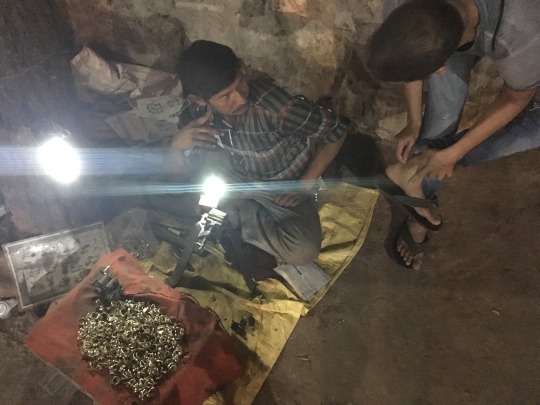
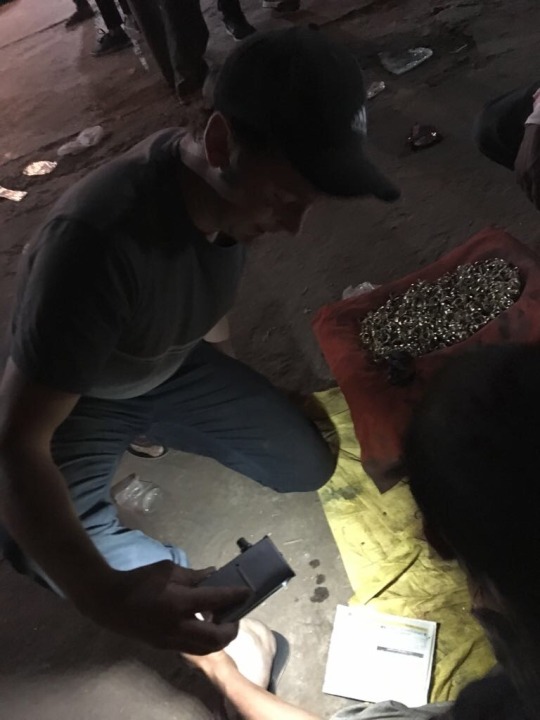
So here is a question: As far as I know doctors in Germany are not allowed to advertise freely and there are tough regulations on advertisement…. but I have to constantly see that advertisement for the German army that looks more like a first-person shooter video game?!?
During a games convention in Cologne the whole city was full of video-game like advertisement to join the army and to “do what really counts”… in “Mali” “[saving democracy]” for “our country”…
Wouldn’t it be nice if doctors are also allowed to freely advertise?

So there have been again some big media houses publishing stories that they have found Satoshi Nakamoto. This time again for real, really... trust us.
The Bitcoin boards on reddit are full of posts about the story. Most of them are very critical and arguing it is a hoax. (wondering why the media companies always fail on that...but that’s a different story)
It seems the whole Bitcoin world has no better topic to talk about. And it seems it gets forgotten that Bitcoin is decentralized and open source...
Even though if someone will be able to proof that she is Satoshi Nakamoto...it does not matter at all in the decentralized network.
All the contributors of all the implementations are Satoshi. All the people publishing source code for the bitcoin ecosystem are Satoshi. All the people writing documentation, articles, help on forums. Everyone involved in mining. Everyone who runs a Bitcoin node. All the organizers of the many Bitcoin related meetups, all the meetup attendees. All the companies working on Bitcoin related stuff. Everyone using Bitcoin, and I the list goes on and on... #IamSatoshi
Let’s keep on working together on Bitcoin the peer to peer network.
We are all Satoshi - How are you Satoshi?